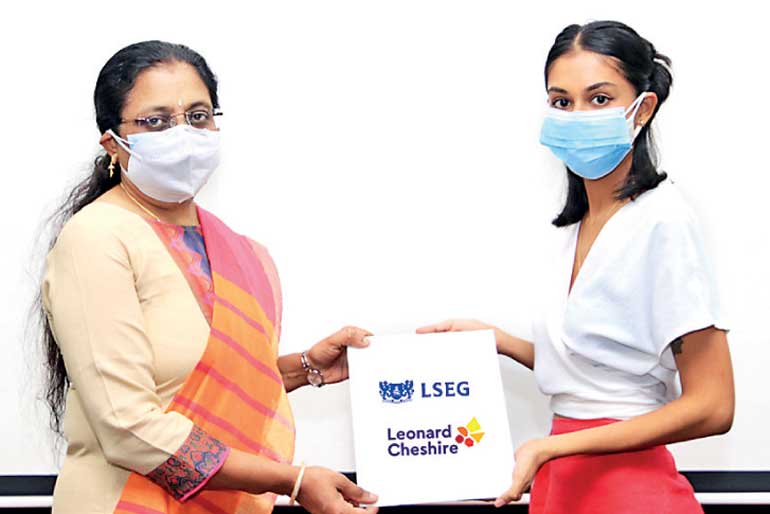Monday Feb 23, 2026
Monday Feb 23, 2026
Saturday, 22 January 2022 00:00 - - {{hitsCtrl.values.hits}}

Leonard Cheshire Regional Representative – South Asia Revathy Rugmini (left) handing over the partnership agreement to LSEG Sri Lanka Associate Manager – CSR and Sustainability Sara Sadoon
LSEG (London Stock Exchange Group) Foundation announced a Rs. 13.6 million (GBP 50,000) initiative to help support, upskill and provide meaningful employment to disabled women in northern Sri Lanka. The initiative is in partnership with UK-based charity Leonard Cheshire, an international charity that supports people with disabilities through inclusive education, employment and community programs.
The initiative titled ‘Access to Livelihoods’, began in June 2021 and is a six-month program designed to increase access to livelihoods for up to 200 women with disabilities, considering their circumstances, barriers to livelihoods, risks and opportunities. At the core of this model is the Livelihoods Resource Centre (LRC), a one-stop-shop where beneficiaries are supported at each stage of their journey including health assessments, psychosocial support, career guidance, vocational training and employment support.
Additionally, the program works towards creating family and community awareness, providing assistive devices for participants, referral services and career guidance, vocational training, business skills training and start-up support, as well as conducting recruitment drives, job placement and follow-up support while working with corporates and the government to conduct sensitisation programs.
Thus far, 174 women with disabilities have been supported by the project, 65 of whom have already attended skills development training. Key project activities such as vocational/self-employment training, sensitisation workshops with employers and government authorities will take place within the coming months as restrictions are eased.
The project follows a study conducted in Jaffna by Leonard Cheshire, whose main goal is to create a fair and inclusive world, where children and adults can live, learn and earn as independently as they choose, whatever their ability. The study found that 28% of the population of Jaffna live with a disability, ranging from mobility, sight and hearing impairments, intellectual disabilities, as well as psycho-social challenges due to trauma. These disabilities are attributed to the civil war that lasted over three decades, leaving close to 40,000 people disabled in the province.
In addition to the Access to Livelihoods program, LSEG SL has also partnered with Leonard Cheshire to conduct Disability Confident Recruitment and Management Trainings for select LSEG Asia Pacific offices as part of a Group-wide initiative to spearhead diverse and inclusive hiring practices.
Commenting on this initiative, LSEG APAC Head of Internal and Site Communications Shanaka Abeywickrama said: “There is a long and deep-rooted culture across our business in supporting charitable projects to not only empower and enrich the lives of our surrounding communities, but to do our part in driving diversity and inclusion at a corporate and grassroot level. Changing lives for the better is at the heart of LSEG Foundation and we firmly believe that everyone deserves the chance to fulfil their potential regardless of what barriers they may face, and we are delighted to partner with Leonard Cheshire to help these women do just that.”
Leonard Cheshire Head of Trusts and Philanthropy Christine Neubeiser said, “The ‘Access to Livelihoods’ project has been carried out for nearly 13 years. Over the years, we have been able to work alongside corporates such as LSEG in improving livelihoods and providing opportunities to people with disabilities. We are glad to have made an impact in Asia by providing skill-based training to over 70,000 people and placing over 55,000 people into waged or self-employed roles. We are really delighted to be working with LSEG to not only increasing these numbers but also the awareness around stigma, discrimination and accessibility issues that disabled people face daily.”